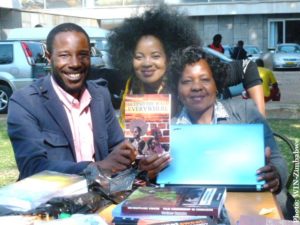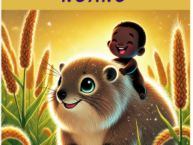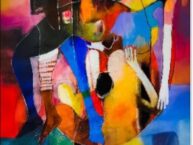
Although author and film maker Farayi Mungoshi comes from an artistically gifted family, he has found his own niche. He recently published Behind The Wall Everywhere and Other Stories (2016, Mungoshi Press) which is an amazing collection of English short stories, and he is finalizing work on the film Makunun’unu Maodzamoyo, based on his father Charles Mungoshi’s novel of the same title. Farayi is the son of two-time Commonwealth Writers Prize winner (Africa Region) Charles Mungoshi. His mother, Jesesi Mungoshi, is an M-Net film award winning actress. Farayi studied film at the European Film College in Denmark. In the following conversation with writer/literary journalist Beaven Tapureta (BT), Farayi Mungoshi (FM) discusses various issues concerning his work as an author and film maker as well as his views on certain subjects affecting the Zimbabwean arts industry.
BT: Farayi, so far how has been the readers’ response to your debut short story anthology Behind The Wall Everywhere?
FM: I’ve been receiving lot of positive feedback locally and from South Africa. A shipment of about twenty copies of the anthology arrived in the UK late last week. I have a brother in the UK. I am yet to hear from him if the books have been distributed. I can say the local market and diaspora have my anthology.
BT: Can we say it has been smooth sailing so far?
FM: Yes, because normally I would see through sales. For instance, during the 2016 ZIBF days and a few months afterwards, we have had good sales.
BT: When is the official book launch?
FM: I have not yet thought seriously about that. I have looked at everything and took some advice from writing friends. There is this thing about book launches and book launches and you find that the person launching a book has used more money in organizing the launch than he or she gets from the actual sales at the launch. It’s kind of a little myth to me. Perhaps if you have a good emcee like what the motivational writers do. They, these motivational speakers, can ‘auction’ the first copies of the book right at the launch, that is, a copy can be bought by the highest bidder ….For example, my young brother Charles Mungoshi Jnr, a motivational writer, I remember he sold one copy of his newly published book for about US$600.00 at one of his launches. I think motivational writers attract businesspeople at their launches which is different from fiction writers. Having said all that, my book launch has to be this year really.
BT: Reading your stories, one can see that they ring loud with ghetto sounds. How has the ghetto influenced your psyche as a writer?
FM: I grew up in the ghetto even though I went to a multi-racial school normally rated one of the A schools in our country, that is, the best schools, so they say. I had a good education. That is something my parents made sure of. I went to boarding school from my primary up until my Advanced level. Yet I was coming from the ghetto. As I have grown up, I have looked back at everything that happened in my life and that’s how the stories come. The ghetto has made me stronger and given me different world views.
BT: Do you think Zimbabwe is posed for a kind of ‘ghetto literature’ coming in the same fold as the Zimdancehall music revolution?
FM: We are in a season in which we have Zimdancehall artists telling their own story through music. They are telling a story that they know. I will, likewise, tell what I have seen, what I have experienced. What we’re going through as a nation involves the ghetto youth.
BT: What’s coming next after Behind The Wall Everywhere and Other Stories?
FM: I’ve got a novel called Serving The Dead which I wrote before the anthology Behind The Wall Everywhere. I have to go through it again although writing friends who read it have said it is okay as it is. I am also working on a new compilation of short stories and another of some children’s stories.
BT: Are you going to write in both Shona and English languages as your father Charles Mungoshi?
FM: Shona is not easy. The truth is, let us wait and see. It’s like a natural process…as when I am praying I start in English but end up immersed in Shona. It’s a natural process. That could also happen in my writing.
BT: Does your mother, the renowned actress, read your works in their finished or unfinished state?
FM: The funniest thing is that my father is the one who would read my fiction stories and my mother is the one who would read my film scripts. She keeps promising she will read my fiction but what she reads are all my film scripts. My father read my stories before he fell ill and he said they are good but I could not believe him. I thought he said it just to please his son! I was convinced only when I some time ago I sent a story to a local magazine and it was published. I knew then I will write.
BT: What was your childhood like?
FM: My mother told me I started writing “things” when I was 7 years old. I was told that my parents got “worried” then that they conspired to stop me. They had a discussion and agreed to stop me from this unusual habit of writing at an early age. I was in Grade 5 when a friend named Tawanda filled in two exercise books with a ‘story’ and that was the time I also discovered the word ‘lackadaisically’ in his story. It went on and on until I was at Prince Edward School where I joined a literary club which I also later led.
BT: What was it like as young boy accompanying your father to literary functions?
FM: I was privileged to have access to my father’s writing friends such as Chirikure Chirikure, Musaemura Zimunya and others. The first time I accompanied my father was to Marondera High School where he was one of the judges of a drama competition. That’s where I heard for the first time the word ‘Bharabhadhiya’ which actually referred to a place in Harare properly known as Belvedere. I think I am blessed that I am son of Charles Mungoshi – the foundation was already laid for me though there is a lot of work to do.
BT: But has the family name Mungoshi affected you in any way, given the artistic legacy it carries wherever it is mentioned?
FM: At some point as I was growing up the popularity of the name in the arts sector affected me negatively. You know, it was a time when I still was discovering myself. Most journeys in life begin with a person’s discovery of who he/she is. I may be in this family yes but for as long as I don’t know who I am I will be doomed. I think now I have answered myself the question: Who am I? I don’t see myself as someone who is very special. My first passion was fiction but I dropped it because people would come to me and say, “Urikuda kunyora? Haumbofa wakakunda baba vako.” (You want to be a writer? You will never be as good a writer as your father). All of a sudden I felt this burden. I didn’t want to be compared with my father. I am my father. We are not against each other. I understand what legacy or heritage means. Family is important to me.
BT: Your family has established the Mungoshi Press which announced its arrival with the publication of your father’s latest book Branching Streams Flow In The Dark. What are the reasons for coming up with the Mungoshi Press?
FM: The reason is we realized that a writer can be very rich and be very poor at the same time. How many writers with books being studied in schools who are driving cars? You can’t even afford an unu elektroroller scooter. I did some research. I visited the Ministry of Education and some local publishers. From what my father went through as a writer, I gathered that there were injustices in the publishing sector. Piracy could just be a lie publishers are using to exploit local writers. As his son, I remember my father would take me to these publishing houses whenever he needed to claim his royalties. You would find that the guys at the top of the company have their own copies which they mysteriously sold, then the guys working in the storerooms have their own copies which they sold via the backdoor and hence actual sales remained a mystery. When we requested for the paperwork that shows the accounts it would take more days to get them and you start questioning the authenticity of the publisher. There is this issue of over-pricing. The publishers’ wholesale price is just too high, prompting bookshops to peg the retail price higher to make a profit, thus leaving parents with no choice but to buy pirated books from the streets. Publishers nowadays are not engaging in book promotions or meet-the-author events.
BT: Is there hope that Mungoshi Press will publish other authors outside the family?
FM: We have had so many submissions. We did work with Apostle Java whose book The Voice we published. We have authors in the UK submitting their works to us. If possible, I would like to apologize to all those submitting their works. While we would like to accommodate other writers, we are facing a few challenges.
BT: Tell us more about your latest film project which is based on your father’s novel Makunun’unu Maodzamoyo. When is the film going to premier?
FM: I directed the film. Actually, it’s a Charles Mungoshi story, a Jesesi Mungoshi production and a Farayi Mungoshi film. It’s a Charles Mungoshi story because it is based on his first book (coincidentally becoming my first film!). Although it is his first book, he had other stories published elsewhere under a pen name Carlos Manhize – I didn’t know my father used a pen name but I had to research about him too! My mother Jesesi Mungoshi is the producer. She does all the fund raising for the film, she appoints and pays. She employed me as film director. The story happens in the 70’s but we have put a modern feel to it. We are at the editing stage now and hopefully the film will be out before the end of the year.
BT: Doesn’t adaptation normally distort the original story?
FM: We have excellent actors and actresses. I don’t usually like to look at film under the fear banner of distortion but I would want to say film has basically the challenge of trying to bring out exactly what the author said, without adding or subtracting anything from the story. The challenges are there but we try our best to maintain the original story.
BT: What’s your view on the state of the local film industry?
FM: We need unity in the film industry. There are small groupings in the industry and that is destroying us. We need to get over our egos and understand that we owe the people of Zimbabwe a story or stories. Film, like literature, communicate and shape the mindset of a people. Right now, Hollywood has shaped us mentally yet we never want to acknowledge the power of film as a tool to direct the way we think especially as proud black people. Local film industry has a long way to go. Our biggest cry is for ZBC to digitalize. We are sort of still very ancient. ZBC can be a platform to develop our industry.
BT: What would you want to say to film and book enthusiasts in Zimbabwe and diaspora?
FM: As Zimbabweans we can use our problems and our diasporan network to spread our identity and culture. We are a very misunderstood people. It works for both film and books.
BT: Farayi, thank you very much for the time, wish you the best in everything.
FM: My pleasure.


